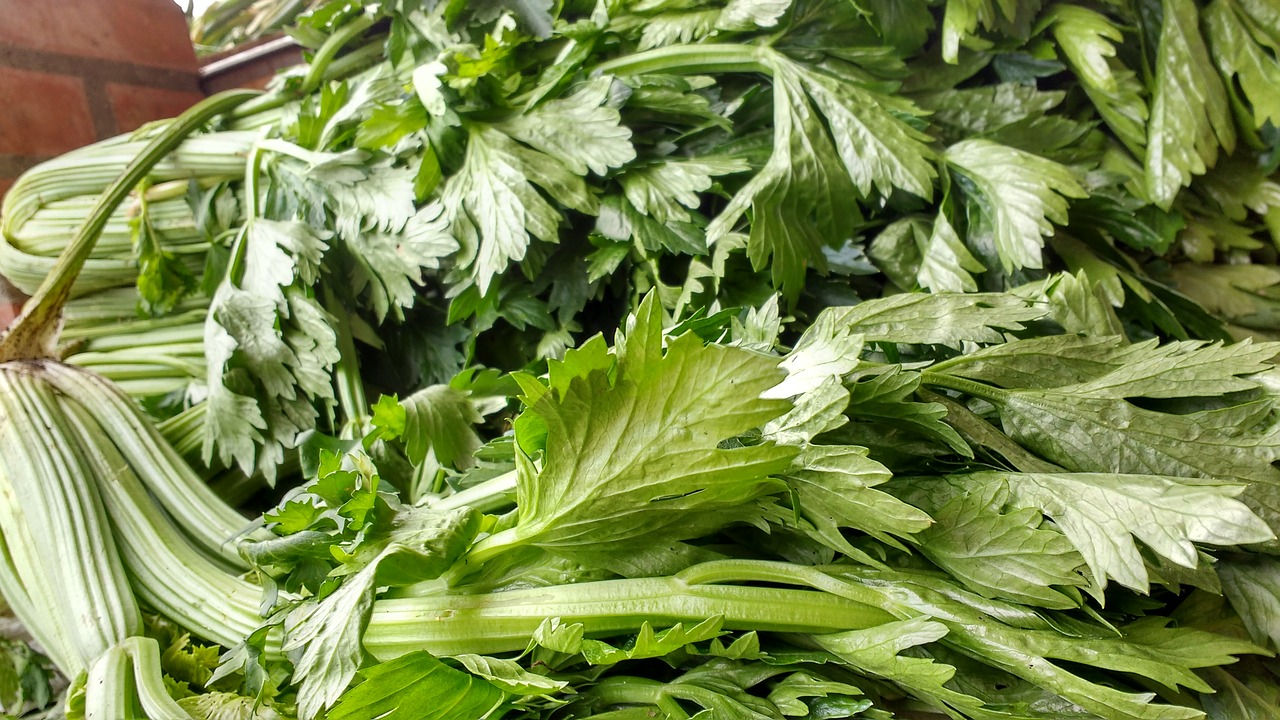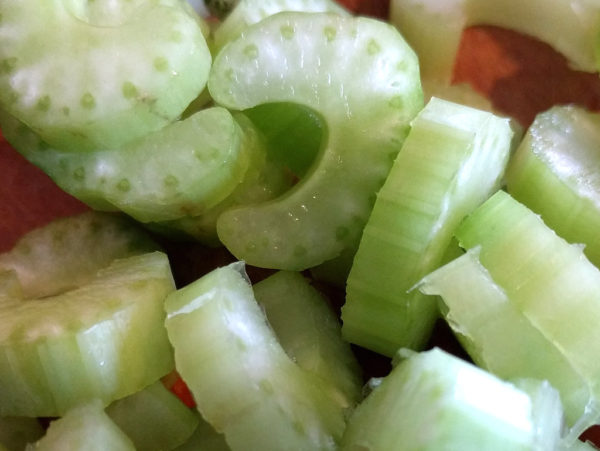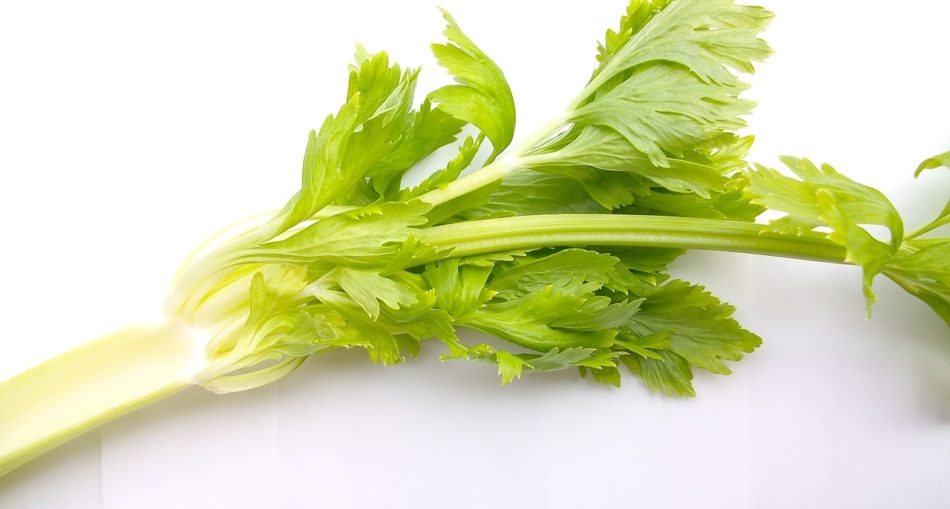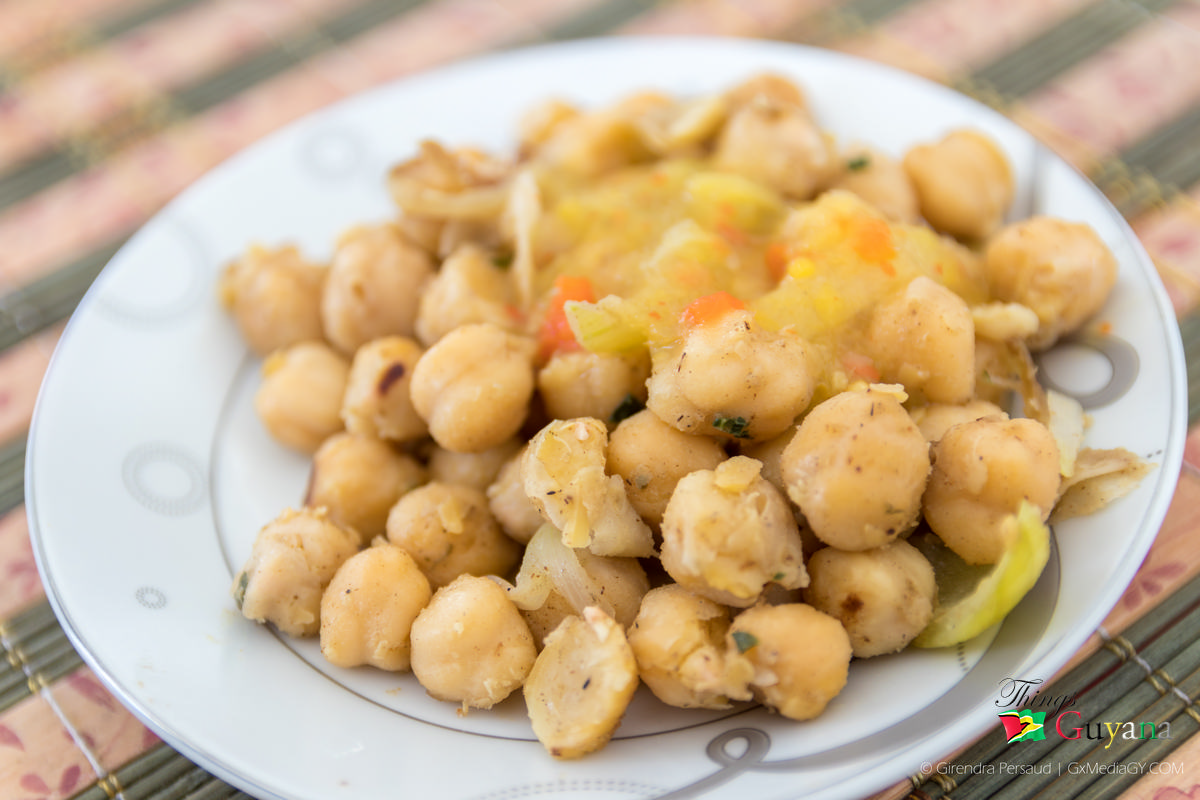Celery (Apium graveolens) is a plant of the Apiaceae family and is consumed as a vegetable. It has long fibrous stalks that are generally eaten as a snack for its low-calorific value. It can be found throughout the world and is an integral part of certain cuisines. It is most commonly found in soups and salads, or as a garnish to certain dishes. It is considered a “health food” because of its low caloric value and significant fiber content. Celery’s common name comes from the French word celeri and the Italian seleri. Both were derived from the Greek word selinon, meaning parsley.
Its wild ancestor was called “smallage“, a bitter-tasting marsh plant that was used primarily as a medicine. Celery was first recorded as a food plant in France in 1623. In Guyana, celery can be found in many Guyanese home gardens.
Where Did Celery Come From?
Celery is native to the Mediterranean region (Europe, Africa, and Asia) but can be found in most parts of the world today.
Description Of Celery
The rhombic leaves of the celery plant grow in a rosette and are 3–6 cm (1.2–2.4 in) long and 2–4 cm (0.8–1.6 in) broad on a branched central stem which is highly ribbed. The plant produces creamy white flowers in dense umbels (an umbrella of short flower stalks) and produces broad oval seeds 1.5–2 mm (<0.1 in) long and wide. Celery is a biennial plant that is commonly grown as an annual and it can reach a height of about 1 m.
Nutritional Value Of Celery
According to the USDA National Nutrient Database, 100 g of raw celery contains minerals such as calcium, magnesium, iron, zinc, and potassium. The vitamins in celery include vitamins A, K, C, E, and the B vitamins (thiamin, riboflavin, folic acid, vitamin and vitamin B6). It mostly made up of water, fiber and some carbs.
11 Superb Health Benefits Of Celery
- Lowers Cholesterol Level – A research study published in the Journal of Agricultural and Food Chemistry suggests that the fiber found in celery may help reduce artery-clogging cholesterol (called LDL or bad cholesterol). The phthalides in these vegetables also stimulate the secretion of bile juices, which work to reduce cholesterol levels. Less cholesterol means less plaque on the artery walls and a general improvement in heart health. The fiber that is found in it also works to scrape the cholesterol out of the bloodstream and eliminate it from the body with regular bowel movements, further boosting cardiovascular health.
- Reduces Blood Pressure – Celery contains organic chemical compounds called phthalides. These compounds can lower the level of stress hormones in your blood. More so, celery seed extracts have shown antihypertensive properties, which means they can help to regulate high blood pressure. Also, a 2009 study revealed that celery has hypolipidemic effects on your body that allow your blood vessels to expand, giving your blood more room to move, thereby reducing pressure. It also contains potassium, which is a vasodilator and helps in reducing blood pressure. When blood pressure is reduced, it puts less stress on the entire cardiovascular system and reduces the chances of developing atherosclerosis or suffering from a heart attack or stroke.
- Prevents Urinary Tract Infections – Celery seeds help in the elimination of uric acid because it is commonly used for its diuretic properties, meaning that it stimulates urination. Therefore, it is good for people with bladder disorders, kidney problems, cystitis, and other similar conditions. The seeds also assist in preventing urinary tract infections in women. There is also evidence showing that celery extract has antibacterial effects as well which has further potential to prevent UTIs.
- Lowers Arthritis Pain – Celery is great for people suffering from arthritis, rheumatism, and gout. It has anti-inflammatory properties that help reduce swelling and pain around the joints. Celery extracts, which contain 85% 3-n-butylphthalide (3nB), are effective in giving relief from arthritis and muscular pains. Because celery acts as a diuretic, it helps remove uric acid crystals that build up around the body’s joints that can add to the pain and discomfort.
- Anticancer Properties – Celery contains phthalides, flavonoids like luteolin, and polyacetylenes. A study conducted at the Molecular Biology and Lung Cancer Program, Lovelace Respiratory Research Institute, USA suggests that luteolin has cancer-fighting properties. Celery also contains coumarins that enhance the activity of certain white blood cells, which can effectively stave off cancer as well.
- Boosts Immune System – Rich in vitamin A and C as well as antioxidants, celery greatly boosts the immune system and makes it more active and efficient. Eating this vitamin C rich vegetable regularly can reduce your risk of catching a common cold, as well as protect you against a variety of other diseases.
- Reduces Asthma Symptoms – Vitamin C present in celery prevents free radical damage and also has anti-inflammatory properties that lessen the severity of inflammatory conditions like asthma. Evidence from the Journal of the American Medical Association suggests that vitamin C may have “a protective effect on the airways of patients with exercise-induced asthma.”
- Prevents Oxidative Damage – Eating celery regularly protects your organs from oxidative damage and helps to avoid diseases of the kidney, pancreas, liver, and gallbladder.
- Manages Diabetes – As per a study published in the Phytotherapy Research journal in 2019, the active ingredients in celery have shown hypolipidemic, antidiabetic, and hypotensive properties. This means that including these crunchy stalks in your diet can help you manage diabetes.
- Nerve Tonic – Celery contains high levels of calcium and magnesium; two minerals that have been shown to significantly reduce anxiety and perceived stress. Additionally, calcium plays an important role in triggering the release of neurotransmitters, which allow the brain to communicate with the body. Celery also contains coumarins, which studies have shown to have potential in treating several neurodegenerative disorders including Alzheimer’s, Parkinson’s, epilepsy and more.
- Weight Loss – Drinking celery juice before meals may help reduce your weight. It is very low in calories and is also filling due to its high fiber content. Therefore, it can help reduce the tendency to overeat and help you keep the weight down without feeling hungry all the time!

Celery | McJapid (pixabay.com)
Culinary Uses Of Celery Worldwide
- Salad: Add chopped stalks to vegetables or meat of your choice. Add salt and crushed pepper to the salad. For the dressing, drizzle lime juice and olive oil.
- Fruit salad: Mix sliced apples and nuts such as peanuts, raisins, etc. with chopped celery in a bowl. Mix orange juice with mayonnaise and drizzle it over the mixture.
- Ants on a log: Cut celery stalks into half vertically, spread peanut butter on the sticks and then sprinkle raisins on them.
- Soups: Add celery stalks and leaves to soups, gravies, etc. as per your choice.

Chopped celery – Flickr: https://www.flickr.com/photos/ruthanddave/36235839251
Word of Caution: The seeds of this vegetable contain volatile oils, flavonoids, coumarins, and linoleic acid, and are therefore not good for pregnant women because they may cause contractions in the uterus. If you are pregnant, check with your doctor before making any major changes to your diet.
Did you know? Celery, onions and bell peppers are the three vegetables considered to be the “holy trinity” of Louisiana Creole and Cajun cuisine.
Celery In Guyana
As you would have read, celery is found in the many Guyanese home garden. It can be incorporated into soups, salads and also garnished to certain foods. Celery is native to the Mediterranean but is found in many parts of the world today. It is packed with many nutrients and has loads of health benefits.
Article References
- https://www.organicfacts.net/health-benefits/vegetable/health-benefits-of-celery.html
- https://plantvillage.psu.edu/topics/celery/infos
- https://www.specialtyproduce.com/produce/Celery_952.php
- https://www.healthbenefitstimes.com/celery/
- Main Image: By flicker – https://www.flickr.com/photos/dasqfamily/2648343226







